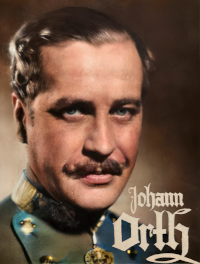
Original Title: Das Geheimnis um Johann Orth. (Johann Orth, der verschollene Habsburger. Das wiener Mädel und ihr Erzherzog.) Historical drama 1932; 83 min.; Director: Willi Wolff; Cast: Karl Ludwig Diehl, Ellen Richter, Paul Wegener, Gretl Theimer, Paul Hörbiger, Paul Otto, Paul Richter, Fritz Alberti, Harry Hardt, Anton Pointner; Ellen Richter Filmprod.-Tobis-Klangfilm.
In 1887, political tensions between two countries escalate over the Bulgarian throne, risking war. Vienna’s young officers support a war to secure the crown for their country. The opposing ambassador warns of danger, while the nobleman finds an unexpected ally. Conflicts arise when he meets a local performer, and the tragic suicide of a royal figure alters his path, leaving his fate uncertain.
Summary
Vienna in the year 1887 marks the backdrop as the Bulgarians, under Russia’s influence, remove their prince, Alexander von Battenberg, paving the way for a pro-Tsar successor in Sofia. Within the intimate confines of a private room at the Hotel Sacher, young officers, including the Crown Prince, voice their discontent with their ruler’s hesitant approach. Unanimously agreeing that Austria should seize the Bulgarian throne, they rally behind Archduke Johann Salvator, an exiled and free-thinking nobleman from Linz. As Johann Salvator arrives in Vienna, he wholeheartedly embraces Crown Prince Rudolf’s ambitious plans. Together, they embark on a fervent quest to establish crucial ties with Bulgaria, and fortune smiles upon them when the Archduke unexpectedly finds an ally at a Russian embassy reception: Princess Rostowska. Determined, she voyages to Bulgaria, ensuring Johann Salvator’s rightful claim to the throne. Meanwhile, in Vienna, the Archduke encounters the captivating soubrette, Milly Stubel, whisking her away to his castle in Orth, near Gmunden. However, the Princess’s visit to deliver the news that Johann Salvator’s path to becoming the Prince of Bulgaria is clear takes an unfortunate turn. A thoughtless slip by Milly Stubel deeply wounds the Princess’s pride, leading her to withdraw her support for Johann Salvator. Ultimately, Rostowsky delivers the Archduke’s plans to the Emperor in a manner that drives Crown Prince Rudolf to take his own life at Mayerling. In a heated confrontation with the Emperor, Johann Salvator relinquishes his prestigious titles and rank. Taking on the persona of Johann Orth, he disappears into the annals of history as the captain of the three-master ship, “Santa Margherita,” forever lost near the treacherous waters of Cape Horn.
j-n.’s review in Film Kurier No. 282 (November 30, 1932)
If Archduke Johann Salvator’s story had been invented by a film writer, everyone would call it pure cinema. But since it actually happened, one is inclined to say that it unfolded like a film. Interestingly, people readily set aside their critical reservations when events portrayed on screen or stage find real-life confirmation. Willi Wolff and Paul Merzbach, the authors of this film, may not adhere entirely faithfully to the documented evidence that served as the basis, but they certainly avoid sentimentalizing it. Instead, they unfold a narrative that distinguishes itself from many works of this genre. Rather than featuring a multitude of historical figures from court and diplomatic life in more or less authentic masks, they focus the plot on a few individuals whose destinies are skillfully crafted.
This is neither a grand historical film nor lavish theater. The characters don’t speak in quotes; they converse in simple and human terms. Vienna in 1887 is vividly characterized through a series of introductory scenes. Russia’s intention to install a Tsar-friendly prince on Bulgaria’s throne sets the stage. A group of Austrian army officers aim to thwart this plan, despite the hesitant Franz Joseph, and push Johann Salvator, who was banished to Linz for his impetuosity, into the currents of their conspiracies. He finds an ally in Princess Rostowska, the wife of the Russian ambassador in Vienna. However, she abandons her cooperation when she realizes that the Archduke is in love with the soubrette Milly Stubel.
Karl Ludwig Diehl portrays the Archduke with subtlety. He doesn’t seek attention or exaggerate, whether in rebellious or lyrical aspects. Dr. Willi Wolff adeptly directs the love scenes without relying on the usual Viennese flair. Paul Hörbiger, playing the Archduke’s bodyguard, exudes enchanting humor, injecting a lovably clumsy nature into dialogues and events, constantly invigorating the proceedings. Paul Otto, one of German cinema’s most esteemed performers, undertakes the ungrateful task of appearing as Franz Joseph. He approaches the role with intensity and a grand vision, avoiding excessive details often associated with portraying monarchs still fresh in the memory of contemporaries. Yet, such portrayals often come across as theatrical. Paul Otto, on the other hand, delivers a convincing performance.
Paul Wegener remains understated in his portrayal of the Russian scheming prince, and Ellen Richter gracefully accepts her few episodes. Nevertheless, these moments are sufficient to showcase her elegance and taste. She plays this ungrateful role within the context of a tragic existence that outwardly appears untragic.
Gretl Theimer’s performance can be somewhat harsh, occasionally overstepping boundaries. Olly Gebauer brings a lively energy to her portrayal of a girl from a Viennese Prater booth. Schünemann’s photography captures the essence of people and buildings with straightforwardness. Hans Sohnle and Otto Erdmann maintain an architectural style that remains objective and avoids deviating into unnecessary ornamentation, a danger not always avoided in historical films.
The musical treatment of the film is quite delightful. Themes by Johann Strauss Jr., Lanner, and Millöcker, compiled by conductor Strasser, resound without overpowering the scenes. They are sparingly used and culminate in a very melodic and unfamiliar waltz, “So lang’ noch durch Wien die Donau fließt” (“As Long as the Danube Flows through Vienna”).
The audience responded positively, repeatedly calling the actors to the stage.